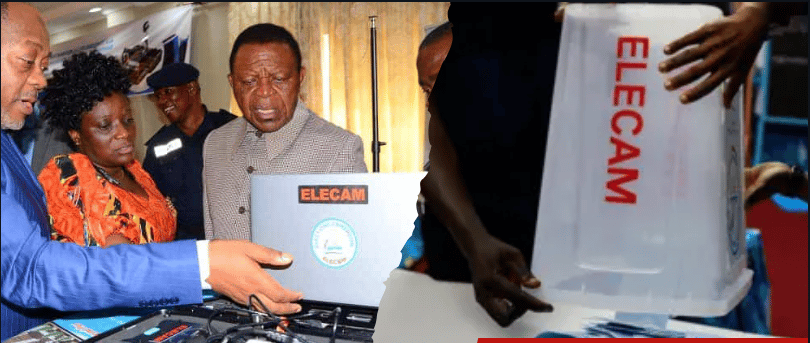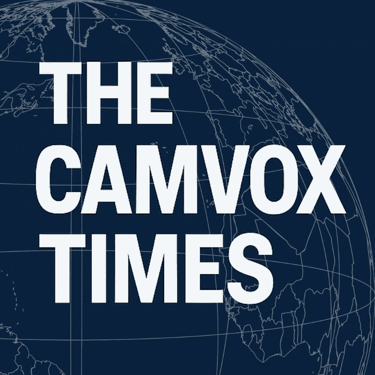Clearing the Air:
What We Do Know — and What Remains Cloudy — in Cameroon’s Post-Election Landscape
The CamVox Times Editorial Board
10/13/2025


In the tense hours and days following Cameroon’s presidential election on October 12, social media feeds, WhatsApp groups, radio talk shows, and even international newsrooms have been flooded with projections, rumors, and unverified claims. Some speak of landslide victories, others of manipulated tallies, widespread fraud, or diaspora vote swings.
But as of now, the only path toward clarity is patience — and rigorously verified facts. In that spirit, here is what the CamVoxTimes editorial desk, grounded in publicly available sources, can confidently report — and where major gaps in knowledge remain.
ELECAM Remains the Only Source of Authority
To date, Elections Cameroon (ELECAM) has not released any partial or preliminary results for the October 12 vote. Counting is ongoing in all ten regions, and under Cameroon’s electoral law, final results must be published within fifteen days of the vote.
These delays, while frustrating, align with precedent in a country where logistical challenges—transporting ballots from remote polling stations, coordinating across linguistic zones, and securing consistent observer coverage—pose real operational burdens.
ELECAM’s own website confirms that its electoral board has published the list of 13 qualified presidential candidates. That list—which notably excluded Maurice Kamto, a once-prominent opposition candidate—was widely disputed and has triggered concerns from human rights groups about the process’s fairness.
According to Human Rights Watch, Kamto’s exclusion “raises concerns about the credibility of the electoral process.”
The Numbers: Registration and Voter Base
One of the key metrics fueling speculation is the voter base itself. ELECAM has previously estimated the number of registered potential voters at over 8,116,960. Other sources suggest around 7.8 million registered voters for the 2025 election cycle.
In the weeks leading up to the election, ELECAM reported having registered over 460,000 new voters, a surge compared to earlier cycles.
However, even with these figures, many eligible Cameroonians remain unregistered—or face administrative, access, or informational barriers to enroll. As election day approached, observers noted that voter registration seemed to lag, with fewer than half of the estimated eligible population enrolled.
Unless and until ELECAM provides tallied ballots by polling station (the procès-verbaux, or PVs), any piecemeal result shared on social media or local radio cannot be confirmed.
Diaspora Voting: Small Scale, Big Noise
Another frequent source of speculation is the role of Cameroonians living abroad. Over time, ELECAM has formalized collaboration with 45 diplomatic missions, designating them as focal points for electoral outreach, registration, and vote management among Cameroonians abroad.
Cameroon’s electoral law stipulates that citizens residing abroad should be entered on electoral registers at diplomatic or consular posts to vote in presidential elections.
Still, the diaspora’s impact is limited by scale: as of the latest credible public figures, the total number of Cameroonians abroad registered to vote is very small compared to domestic voters. Some reports put the diaspora electorate at about 34,000, or less than 1% of the national total—though that number remains unverified in the current cycle.
When social media purports to show “tallies from France, Saudi Arabia, Kenya,” it is essential to treat them as anecdotal and unverified unless backed by official diplomatic or ELECAM data—none of which has yet been published.
Why the Delay—and What the Risks Are
Given the logistical weight of the operation—transporting ballots, ensuring secure storage, reconciling signed PVs, coordinating regional offices—ELECAM delays are not inherently suspicious. In prior elections, authorities have taken several days to cross-check signatures, adjust for electoral discrepancies, and await observer reports.
However, the delay does elevate the stakes:
It gives space for rumor networks to fill the vacuum.
It increases pressure on state and nonstate actors to spin early “leaks” or misattributed data as fact.
It strains public trust in the process—and in the very institutions meant to safeguard it.
Even as ELECAM is partnering with the United Nations and the UNDP for technical assistance in the 2025–2027 electoral cycle, critics point to structural vulnerabilities: the electoral board is widely seen as subject to political pressure, and the exclusion of prominent challengers undermines perceived legitimacy.
What We Do Not Know (Yet)
These key questions remain unanswered:
Breakdown of turnout by region and polling station
Without signed PVs, the geographic shape of the vote is speculative.Margin of victory
Whether the winner (if declared) commands a small or sweeping lead remains unclear.Discrepancy reports from observers
We await mission findings from domestic and international watchers to confirm or contest irregularities.Official acknowledgment or rejection of rumors
ELECAM may issue counter-statements, but so far has remained silent.Diaspora results submitted through diplomatic posts
Until embassies or consulates report formal counts, claims of diaspora tallies must remain speculative.
In this moment of uncertainty, the responsible posture for media—including CamVoxTimes—is measured skepticism. We affirm three guiding principles:
Do not amplify unverified tallies. Rumors, memes, and viral screenshots deserve pushback, not proliferation.
Hold ELECAM to account. Public pressure must be maintained for transparent, timely publication of signed PVs and full results.
Encourage patience and calm. In the absence of clear facts, sweeping narratives—“landslide,” “fraud,” “huge upset”—are premature and harmful.
The truth, when revealed, will come through verifiable documents, observer reports, and the published word of Cameroon’s electoral institutions—not through megaphones or rumor mills.
CamVoxTimes remains committed to lifting propaganda, preserving public trust, and broadcasting only what can be justified by documented fact.
